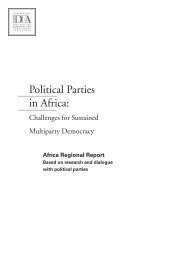Seminar Report The role of Political Parties in Democratic Transitions
Seminar Report The role of Political Parties in Democratic Transitions
Seminar Report The role of Political Parties in Democratic Transitions
Create successful ePaper yourself
Turn your PDF publications into a flip-book with our unique Google optimized e-Paper software.
could also <strong>in</strong>vest more time <strong>in</strong> negotiat<strong>in</strong>g their differences, try to f<strong>in</strong>d a common agenda on which they<br />
can cooperate and seek a dialogue with <strong>of</strong>ficials.<br />
3. What are two sources <strong>of</strong> ideas your party can use to help it th<strong>in</strong>k <strong>of</strong> solutions to problems fac<strong>in</strong>g<br />
Myanmar?<br />
<strong>The</strong> group prioritized an all-<strong>in</strong>clusive dialogue, trust build<strong>in</strong>g, hear<strong>in</strong>g and listen<strong>in</strong>g to peoples’ voices and<br />
capacity build<strong>in</strong>g <strong>of</strong> the general population as the ma<strong>in</strong> sources to f<strong>in</strong>d solutions to problems fac<strong>in</strong>g<br />
Myanmar. When parties want to understand and propose solutions to problems fac<strong>in</strong>g the educational and<br />
agricultural sector, the group identified the follow<strong>in</strong>g possibilities: Meet<strong>in</strong>g the academia, consultants, civil<br />
society, government and do<strong>in</strong>g more research by the parties.<br />
Mr Thomas Cormier emphasized that it is important to f<strong>in</strong>d the right people to reach out to when your party<br />
seeks more <strong>in</strong>formation on specific topics. You could try to identify new party members with a specific<br />
background so they can share their knowledge and experience on certa<strong>in</strong> party policies for example. It is<br />
important to be smart and <strong>in</strong>clusive, parties should therefore make sure that young people and women are<br />
sufficiently <strong>in</strong>tegrated <strong>in</strong> their party and <strong>in</strong> its general policies <strong>in</strong>stead <strong>of</strong> creat<strong>in</strong>g a separate youth or<br />
women’s w<strong>in</strong>g. Furthermore Mr Tom Cormier po<strong>in</strong>ted out that political parties do not have to take on the<br />
responsibility <strong>of</strong> hav<strong>in</strong>g all the knowledge themselves. Instead, parties have to engage with people who do<br />
such as scholars, civil society, the general population, etc.<br />
4. What are the two th<strong>in</strong>gs political parties can do now that they could not do three years ago?<br />
Participants mentioned that important changes <strong>in</strong> the last three years are the freedom <strong>of</strong> expression,<br />
freedom <strong>of</strong> campaign<strong>in</strong>g and freedom <strong>of</strong> the media. Moreover, the number <strong>of</strong> people <strong>in</strong>terested <strong>in</strong> politics<br />
has <strong>in</strong>creased. <strong>The</strong> fact that political parties can now negotiate amongst each other is an important<br />
opportunity, which the parties need to make more use <strong>of</strong>. <strong>Parties</strong> should further promote the general<br />
<strong>in</strong>terest <strong>in</strong> politics and make use <strong>of</strong> the freedom <strong>of</strong> campaign<strong>in</strong>g. Mr Tom Cormier <strong>in</strong>dicated that the<br />
grow<strong>in</strong>g freedom <strong>of</strong> the media is also an opportunity because all new newspapers need stories to fill their<br />
pages and are therefore receptive to <strong>in</strong>formation from, amongst others, the political parties. It is therefore<br />
important to engage with the media. It is important that party members, NGOs and the media all know<br />
what a political party represents; who represents it; that the public knows that the party is <strong>in</strong>volved <strong>in</strong><br />
society; and that it cares about what is go<strong>in</strong>g on. Hav<strong>in</strong>g such a party identity might also <strong>in</strong>spire new<br />
members to jo<strong>in</strong> <strong>in</strong> the political process.<br />
2.2. Workshop 2: Facilitat<strong>in</strong>g a Multiparty Dialogue: Challenges and ways forward <strong>in</strong> Myanmar<br />
By Mr Shaun MacKay and local co-facilitator Mr Kh<strong>in</strong>e W<strong>in</strong>, Sandhi Management School<br />
This session focused on facilitat<strong>in</strong>g a multiparty dialogue. As a source <strong>of</strong> <strong>in</strong>spiration for political<br />
practitioners from Myanmar, it focused on the <strong>role</strong> and modalities <strong>of</strong> <strong>in</strong>formal dialogue platforms <strong>in</strong><br />
countries where NIMD and DIPD work. <strong>Political</strong> parties have a critical <strong>role</strong> <strong>in</strong> foster<strong>in</strong>g the creation <strong>of</strong> a<br />
system, which encourages dialogue and <strong>in</strong>teraction. <strong>The</strong> tone <strong>of</strong> political discussion will be determ<strong>in</strong>ed by<br />
the way <strong>in</strong> which parties engage with each other. But the shift from authoritarian regime to a more<br />
democratic rule is likely to reveal many tensions that would previously have been suppressed. <strong>Transitions</strong><br />
<strong>in</strong>volve people learn<strong>in</strong>g to <strong>in</strong>teract with each other on a new basis and that negotiation and compromise<br />
do not constitute weakness, but rather represent a healthy part <strong>of</strong> liv<strong>in</strong>g <strong>in</strong> a democracy. For parties that<br />
dialogue will <strong>of</strong>ten result <strong>in</strong> different political actors recognis<strong>in</strong>g that they have common objectives.<br />
<strong>The</strong> workshop particularly facilitated a dialogue around the follow<strong>in</strong>g questions:<br />
Why it is important to have an <strong>in</strong>formal multiparty platform outside parliament?<br />
How do you start an <strong>in</strong>formal multiparty dialogue process?<br />
How do you structure a multiparty dialogue platform?<br />
At the outset <strong>of</strong> the workshop Mr Shaun MacKay emphasized the importance <strong>of</strong> trust and confidence as<br />
critical <strong>in</strong>gredients for effective dialogue and cooperation. First, he stressed, politicians need to get to<br />
12
















